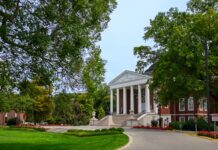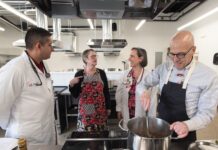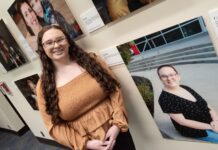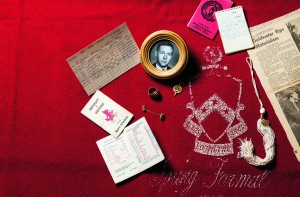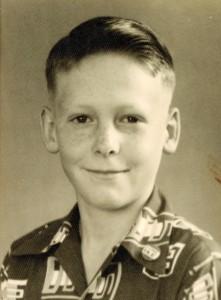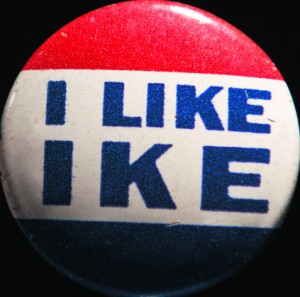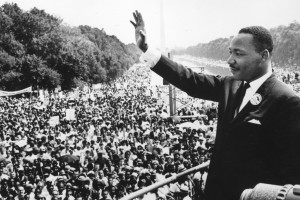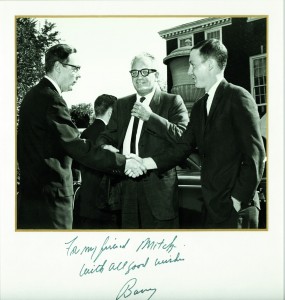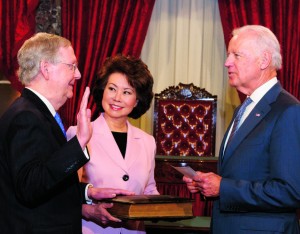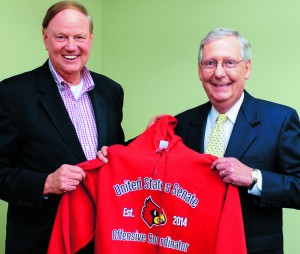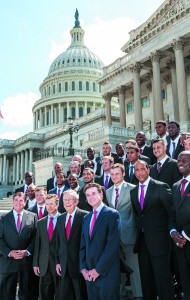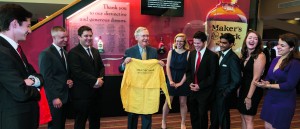FOR ALUMNUS MITCH McCONNELL, A POLITICAL CAREER WAS ALWAYS IN THE CARDS
COLLEGE IS OFTEN THE TIME when young men and women choose their life’s path. But, by the time Addison Mitchell “Mitch” McConnell, 64A, took his first class on UofL’s Belknap Campus in 1960, he had a good idea where he might head. His experiences at UofL sealed the deal.
At UofL, he was active in student government, president of the Arts & Sciences student council, a member of Phi Kappa Tau fraternity, business manager for The Louisville Cardinal newspaper and named “Outstanding Man” in both his sophomore and junior years.
Today, at 73 years old, Sen. Mitch McConnell is the U.S. Senate Majority Leader, and Kentucky’s longest-serving senator, marking 30 years in 2015. He works on an international stage, has the ear of the White House and is instantly recognizable to millions worldwide. Time magazine recently named him one of the “Time 100” most influential leaders in the world.
From the steps of Grawemeyer Hall to the Majority Leader’s office on Capitol Hill is quite a journey. As he celebrates the 30th year of his Senate tenure, McConnell sat down with us to reflect on memories from UofL to the pinnacle of his Washington career.
THE JOURNEY BEGINS
It was not an easy journey for McConnell. He was born in Alabama in 1942, the only child of World War II veteran Addison Mitchell McConnell and Julia Shockley McConnell. He suffered from polio as a young child, and his mother sought treatment at Warm Springs Institute for Rehabilitation in Georgia. She was a bulldog in finding her son the best doctors and options for a full recovery. His mother’s tenacity in his care instilled a sense of incredible discipline in McConnell.
His taste for politics started at a young age. He sported an “I Like Ike” button in elementary school and by the time he reached Gottschalk Jr. High School, he was student council vice president. He learned early to win the “celebrity endorsement” and support of cheerleaders and football players, and distributed handmade pamphlets to every student locker. Soon, he locked up the nomination for student council president. “You know, I never liked being vice president of anything,” he said.
The family moved to Louisville in 1956, where McConnell entered duPont Manual High School in 1957. “I didn’t go very far away for college,” he chuckled. “Of course, I went to Manual and two blocks from there was UofL. I told my friends I wasn’t ready to learn how to do my laundry yet, and I actually enjoyed living with my parents.”
“The big eye opener academically was I began to take classes I was excited about in history and politics,” he said. “I was a pretty good student and a member of the honor society.”
McConnell befriended professor Grant Hicks, of whom McConnell said, “(he) was the one campus conservative in those days; I think he had to eat lunch by himself.” He also closely followed political science professor Louis Kessleman. Under their guidance, he focused his studies on political science.
He unwittingly spied his future in 1962, when he was instrumental in bringing Sen. Barry Goldwater to campus. “Sen. Goldwater spoke at the quadrangle, and there, on the front page of The Courier-Journal was UofL president Dr. Davidson, Barry Goldwater and 20-year-old me,” recalled McConnell. “Ironically, the first two years of my Senate tenure were Goldwater’s last two years in the Senate. When I got to Washington, I took my framed photograph of that event to his office and got him to autograph it.”
In August 1963, his junior year, McConnell was an intern to Kentucky U.S. Representative Gene Snyder. He witnessed history when he stood on the steps of the Capitol in Washington, D.C. one afternoon, and although he could not hear the iconic words “I have a dream,” spoken by Martin Luther King Jr., McConnell recalled, “I knew I was in the presence of something really remarkable.”
He knew then he had to be a part of this change, this power, this government. It felt right. Later, after graduating with honors in political science in 1964, McConnell returned to Washington and worked in the office of his mentor and political hero, Kentucky U.S. Senator John Sherman Cooper.
“All of these experiences whetted my appetite for politics,” he said. “I concluded I at least wanted to take a shot at it. I wanted to try.”
Always the stoic, methodical planner, McConnell launched his carefully thought-out path. He attended law school at the University of Kentucky, where he was president of the student bar association. Armed with a law degree, he returned to Louisville.
THE ROAD TO THE SENATE
He determined early on that he had to build a name and support. He did not have a prominent Louisville family name or background. He began a calculated resumé-building platform that included practicing law for a bit, then working on political campaigns. He returned to Washington for two years as the chief legislative assistant to Kentucky U.S. Senator Marlow Cook, came back to Louisville to work on gubernatorial campaigns and then found himself in Washington again as a deputy assistant attorney general under President Gerald Ford in 1974.
In 1978, he was back in Louisville, and took office for the first of two terms as Jefferson County Judge-Executive. Following a spirited campaign in 1984, he secured his Senate seat in an upset over incumbent Sen. Walter “Dee” Huddleston. During his 30 years in the U.S. Senate, he has risen to be the Senate Republican Whip, the Senate Republican Leader and now, Majority Leader of the Senate.
“The first 10 years were rough,” admitted McConnell. “I had seven different jobs between law school and the time I was elected Jefferson County Judge-Executive, but I’ve only had two jobs since then. I guess I finally settled down and got steady employment.”
#L1C4
Politics and international business aside, when it comes to a rare opportunity to relax, McConnell turns to sports. He is an avid basketball, baseball and football fan in particular. He cheers for the Washington Nationals, but his heart is at home.
“I’m an enthusiastic backer of UofL sports,” McConnell said, and in quite possibly the understatement of the year, added with a grin, “You know, I have a fairly competitive nature.”
He can often be found at UofL home football games. Friends talk of his deep memory of sports statistics and the ability to discuss knowledgably the players, coaches and plays.
Off the field, McConnell set his sights on his other love besides politics — education.
In addition to the funds he’s secured over the years for higher learning and research throughout Kentucky’s higher education system, he envisioned putting together an undergraduate program that would attract top-level students from Kentucky, who would graduate with honors and establish roots in Kentucky.
In 1991, the McConnell Center at the University of Louisville was born. The non-partisan McConnell Center identifies, recruits and nurtures Kentucky’s next generation of leaders. Working with the core principles of leadership, scholarship and service, the McConnell Scholars Program provides 40 undergraduate UofL students the ability to participate in liberal arts seminars, meet world leaders and earn tuition and travel scholarships. In addition to the academically rigorous program, the McConnell Center offers a public lecture series that invites influential political leaders, business executives and accomplished scholars to UofL. It also houses the Sen. Mitch McConnell and Sec. Elaine L. Chao Archives.
The McConnell Scholars program is not limited to future politicians. “We’ve had pre-med, pre-law students and even a music major,” McConnell said. “There are a lot of ways to be a good citizen that don’t involve running for office,” he added. “By the time they leave UofL, these students participate in the political process and they make a difference by exercising leadership skills in whatever field they choose.”
The lecture series has brought international recognition and media coverage to UofL’s campus. “I’ve been scrupulously bipartisan about this,” McConnell said, noting the balance between speakers who include President George W. Bush, presidential candidate and former Secretary of State Hillary Clinton, Vice President Joe Biden, and many others.
“We’ve had some pretty magic moments,” McConnell added. “Colin Powell was here a month after 9/ll. It was the first major 9/11 address by the Secretary of State, it was carried live around the world, and it was at UofL.”
BUILDING A LEGACY
“It’s no exaggeration to say that Kentucky’s research universities would simply not be where they are today without his help,” said President James Ramsey. “His tenacity in securing federal funds to build our research facilities is resulting in a better quality of life for all of us. No university has a better friend than Senator McConnell.”
“I’m proud of how far UofL has come since the days I was here,” McConnell said. “All the student government experiences I had at UofL were good practice for what I’ve spent my life doing. I have nothing but the best feelings about my four years at UofL.”
McConnell has accomplished much since those days campaigning for student council. He’s far from finished. “There are a lot of things I want to see the country do differently, and I have a better opportunity as leader of the majority than I have had in the past to steer us in a different direction,” he said. “I’m still looking forward. There’s much to accomplish.”
“What I always tell kids is there are only two ways to fail in America, quit or die,” he stated. “I remind them there will always be speed bumps in life, and in this great country of ours, if you are not defeated by the setbacks you will inevitably have, you will succeed. The only way not to succeed is to give up.”
“All of these experiences (at UofL) whetted my appetite for politics. I concluded I at least wanted to take a shot at it. I wanted to try.”
—Sen. Mitch McConnell
“It’s no exaggeration to say that Kentucky’s research universities would simply not be where they are today without his help. No university has a better friend than Senator McConnell.”
—President James Ramsey













